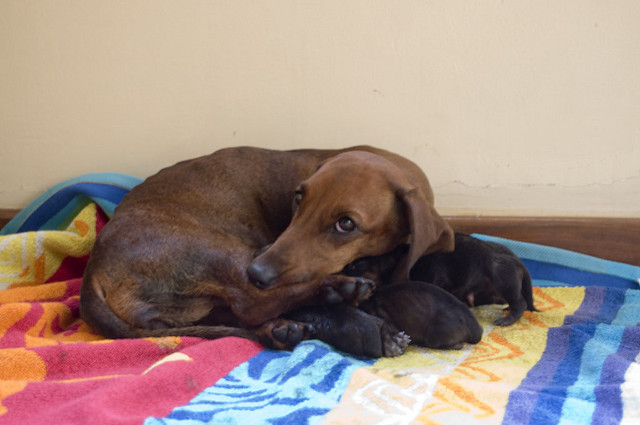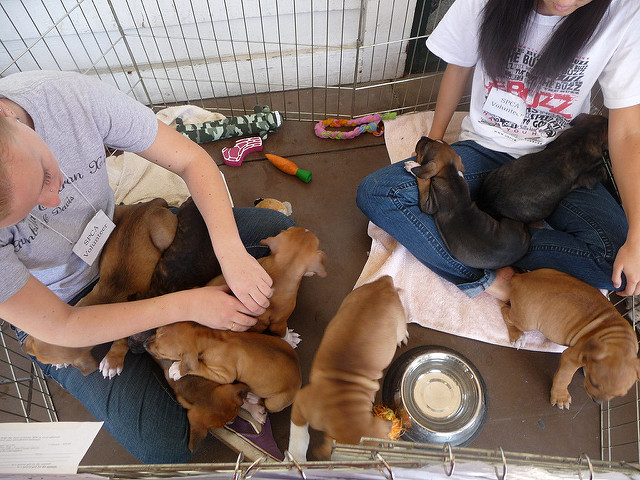A litter of puppies may seem like they don’t do much – eat, sleep, play a bit, repeat. But you may be surprised at just how much those puppies are learning and how what they learn will affect the dog they become. In fact, behavioral problems you are dealing with now may likely have stemmed from what happened (or didn’t happen!) before you bring your puppy home.

Those First Several Weeks
While those puppies are certainly eating and sleeping a great deal, they are also learning. During those first few weeks, your puppy is learning about the world. Is it safe? Is it scary? How does mom react to new noises and people? Even before their eyes are opened, puppies are getting a feel for the world they are going to live in.
How the mother reacts to new noises and sounds will affect the puppy. Behaviorists have found that a fearful mom will create fearful puppies. It’s not only genetic, but it’s also environmental. Mom starts at a loud noise, the puppies will too. Mom is calm and relaxed, the puppies will be too.

Puppies also learn from their siblings. The most important thing they learn is bite inhibition. When a puppy bites her sibling (or mother!) too hard, they will cry and maybe even bite back, teaching the puppy to not bite as hard. This is very important to us, since we have even softer skin and no fur to protect us!

During this time puppies learn stability and protection. Puppies who are taken away from their mother early – before 8 weeks but especially before 6 weeks – are more prone to:
- Separation anxiety
- Increased fear and nervousness
- Excessive barking
- Food/toy guarding
- Aggression
- Potty training issues
- Destructiveness
(Original paper published in Veterinary Record August 2011, no longer available online)
What This Means To A Prospective Puppy Parent
Have you ever wondered why your dog is the way he is? Maybe he ended up being more fearful than you expected, or maybe he has a biting problem. Maybe you are dealing with separation anxiety in your home. These problems may start in the whelping box. So what can you do?
Ask about the mom. Learn as much as you can about the mother’s temperament since she is going to be instilling that on the puppies.
Ask about socialization. The breeder should be exposing the puppies to new sounds, sights, surfaces, people, etc.

Try not to get your puppy before 8 weeks. New studies are still being done to figure out the optimum age, but right now the guess is closer to 9-12 weeks. Aside from all the good stuff they are learning listed above, this is a “sensitive period” for a puppy. Bringing them into a new environment during this time is harder on them and may cause fear and anxiety. They have found that puppies that stay with their litter and mother until at least 9 weeks, tend to be more easy-going and open to new experiences.
Don’t shop. According to the study mentioned above, all these issues are even more likely if the puppy was taken from his litter too early and then to a pet store, where socialization is even more limited and the environment more stressful.
If your puppy is coming from an unknown environment, knowing this information can help you set up a plan of counter-training to help your dog overcome these obstacles. For example, you may have to counter-condition for a fear of new places or handling training for the adolescent dog who still bites because he was separated from his littermates at 5 weeks. This is vital information that will hopefully give you new patience and understanding for all the obstacles a rescue dog goes through.
